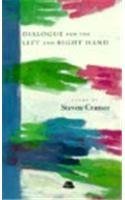Steven Cramer’s third poetry collection orchestrates a complex interplay of voices: lyrical, colloquial, mordant; even, at times, enraged. Whether in fixed forms or free verse, the raw energy of these poems derives power from Cramer’s restraint -- his sense of line, of stanza, of pattern. Here are sensuous memories, mysterious as the unlit room in which a boy, "opens his eyes, and in the blue light/From the window sees, or thinks he sees,/The door open an inch or two, no more." Here also are evocative homages to the "tutors" of the imagination: John Keats' snow-swept heath, admonishing us to be "simple, watchful, true." And here are fictions of the spirit, appeals to deities who wait at the top of the stairs. Sometimes narrative, sometimes startlingly associative, always shaped and honed, Dialogue for the Left and Right Hand is Cramer’s most diverse, and best, work to date.
Steven Cramer is the author of two previous collections of poetry, The Eye That Desires to Look Upward (The Galileo Press, 1987) and The World Book (Copper Beech Press, 1992). His poetry and criticism have appeared in The Atlantic Monthly, The Nation, The New Republic, The Paris Review, Partisan Review, Poetry, Triquarterly, and numerous other periodicals. The recipient of fellowships from the Artists Foundation of Massachusetts and the National Endowment for the Arts, he teaches literature and poetry writing at Bennington College.
Dialogue For The Left And Right Hand is a diverse collection of poems orchestrating a complex interplay of voices: lyrical, colloquial, mordant, and (at times) enraged. Whether in fixed forms or free verse, these poems have an energy and architecture all their own. Here are sensuous memories and fictions of the spirit, etchings of people who come alive and walk with us through heaths of snow, and appeals to deities waiting for us at the top of the stairs. Sometimes narrative, sometimes startlingly associative, these poems reflect the skill of a master wordsmith plying the craft and passion of poetic expression. "Who spills a ring of gasoline/Across fresh-fallen snow, imagines/Cross hairs in his sights,/Then lights the edge/And flips the match out on his tongue. -- Midwest Book Review
